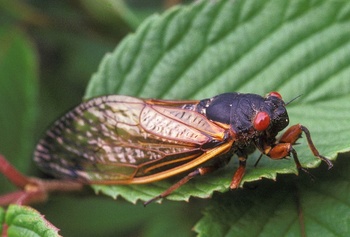Cicadas will be emerging in a few weeks - but do they pose a risk to pets?

Flickr photo by USDAgov
They live about a foot underground as nymphs for most of their lives, feeding on roots of a tree. We do see these insects more often then every 17 years, as there are 12 groups, or broods, of them that emerge in a staggered timeframe across the region.
Noted for the unique noise that the male cicadas create by way of an organ under their wings called a tymbal, the one objective that they have once they make their way from underground once the soil reaches a certain temperature is to find a mate.
The cacophony that they create can be surprisingly loud, but it's all in an effort to find a partner and reproduce.
The periodical cicadas are only found in the eastern part of North America, and I having grown up here, I can remember hearing that all-too-familiar noise during the months of May and June, which I never found to be troublesome.
The cicada, with their seemingly magical life cycle (hence their Latin name, Magicicada) and size of their broods have a system in place in order to keep the species alive and well: their sizable numbers overwhelm any predator, ensuring that at least some survive. And any predator wouldn't be able to depend on their annual availability because of the span of time in between emergences.
And the large numbers of Magicicada that congregate can pose an obvious problem when at an outdoor gathering, but more importantly, for young trees that can get overwhelmed by the large number of eggs that the females lay on their tender branches.
As far as predators go, just about any animal will scarf up cicadas, including dogs and cats — and why not? They're interesting to pets as most insects are, and surely they'll be eager to play with and eat the bugs, which can get up to a couple of inches in length.
So, are Magicicada bad for your pets?
As Dr. Tina Wismer of the American Society for the Prevention of Cruelty to Animals' Animal Poison Control Center tells it, overindulgence in the crunchy creatures tends to be more of an issue.
"If they eat enough of them, we could see some stomach upset, either vomiting or diarrhea."
The crunchy outer shell of the insects, or exoskeletons, aren't digestible, so they usually pass in the stool. That said though, in theory if the bugs are eaten in large quantities, the exoskeletons could cause an obstruction in the gut.
To read more on Magicicada, click here for a recent interview on Vetstreet with cicada experts Gene Kritsky, PhD and Michael Raupp.
Lorrie Shaw leads the pets section for AnnArbor.com and owner of Professional Pet Sitting. Shoot her an email, contact her at 734-904-7279 or follow her adventures on Twitter.


Comments
Elaine F. Owsley
Mon, Apr 29, 2013 : 11:37 a.m.
Our girls enjoyed playing with the empty shells left on tree bark and would build villages for them to "live" in under the trees. There was an amazing supply of "residents" available. That would have been after their "outing" 34 years back.
Chimay
Fri, Apr 26, 2013 : 3:17 p.m.
I lived in DC when whatever brood came out in 2004. It was awful. Every step outside was crunchy, the windshield was constantly covered with dead cicadas, they were louder than the Beltway, and overall were a real nuisance. There were billions of them. I'm glad I had that experience, it was interesting, but I don't wish to repeat it.
RunsWithScissors
Thu, Apr 25, 2013 : 8:26 p.m.
It's time to dust off the recipe for Cicada-Rhubarb pie! But seriously, thanks for the warning. My pooch is prone to "eat first, barf later" when it comes to new edibles.
mady
Fri, Apr 26, 2013 : 2:17 p.m.
YACCCCCCK! I'd rather eat sawdust.
Lorrie Shaw
Thu, Apr 25, 2013 : 9:05 p.m.
RunsWithScissors, Oh, these gems are a delicacy in many countries. In my research, I found that they are served several ways: boiled, fried or skewered. One expert noted that boiled, they taste much like shellfish. Also, since they are an invertebrate, if one has an allergy to shellfish, they should steer clear of eating them as they can cause a like reaction. Huh! Thanks for your comment! :)
Tru2Blu76
Thu, Apr 25, 2013 : 4:02 p.m.
Brood X (Magicicada septendecim), a decidedly creepy rock song by The Significant Others. But thanks for the educational article, our cicadas sometimes provoke unnecessary fears. Perhaps interesting is that there's a 13-year cycle as well, these two broods or swarms are the most numerous compared to the so-called "annual cicadas" which apparently are also overlapping each other with 2 - 5 year hatch cycles. This year will mark the 2nd 17-year cycle since I moved to Ann Arbor. I noticed in 1996 that, compared to news reports from elsewhere and my own memory, fewer cicadas were "singing." I wondered, since lawn grubs are mostly cicada larvae, whether lawn-care in town might be responsible for the fewer numbers.
Lorrie Shaw
Thu, Apr 25, 2013 : 9 p.m.
Tru2Blu76, They do have a tendency to needlessly spark uneasiness with people, but as you note they are harmless - they don't bite or sting. All they want to do is mate! :) Yes, there is a 13-year cycle Magicicada as well, you're correct. Other cicadas are annual as well. As I understand it, most of the North American species are in this genus Tibicen and those emerge in late July and August. I, too remember hearing far less of these amazing creatures now that I'm older. As a kid, I recall hearing them often in our area and the sound could be deafening. I'll wager that chemicals could be the culprit. Thanks for your most interesting comment. I appreciate that observation!